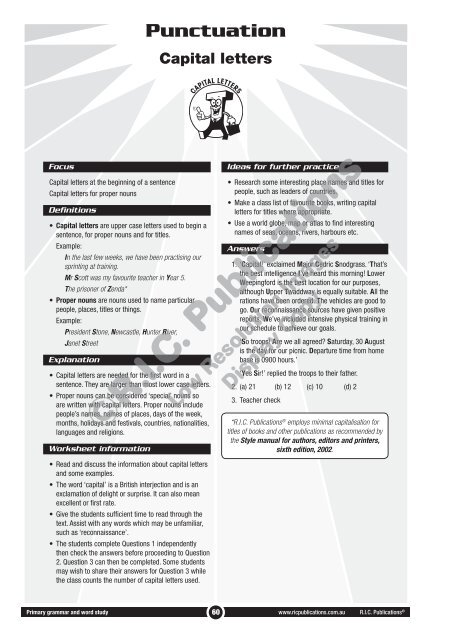RIC-20236 Primary Grammar and Word Study Year 3 – Punctuation
You also want an ePaper? Increase the reach of your titles
YUMPU automatically turns print PDFs into web optimized ePapers that Google loves.
<strong>Punctuation</strong><br />
Capital letters<br />
Focus<br />
Capital letters at the beginning of a sentence<br />
Capital letters for proper nouns<br />
Definitions<br />
• Capital letters are upper case letters used to begin a<br />
sentence, for proper nouns <strong>and</strong> for titles.<br />
Example:<br />
In the last few weeks, we have been practising our<br />
sprinting at training.<br />
Mr Scott was my favourite teacher in <strong>Year</strong> 5.<br />
The prisoner of Zenda*<br />
• Proper nouns are nouns used to name particular<br />
people, places, titles or things.<br />
Example:<br />
President Stone, Newcastle, Hunter River,<br />
Janet Street<br />
Explanation<br />
• Capital letters are needed for the first word in a<br />
sentence. They are larger than most lower case letters.<br />
• Proper nouns can be considered ‘special’ nouns so<br />
are written with capital letters. Proper nouns include<br />
people’s names, names of places, days of the week,<br />
months, holidays <strong>and</strong> festivals, countries, nationalities,<br />
languages <strong>and</strong> religions.<br />
Worksheet information<br />
• Read <strong>and</strong> discuss the information about capital letters<br />
<strong>and</strong> some examples.<br />
• The word ‘capital’ is a British interjection <strong>and</strong> is an<br />
exclamation of delight or surprise. It can also mean<br />
excellent or first rate.<br />
• Give the students sufficient time to read through the<br />
text. Assist with any words which may be unfamiliar,<br />
such as ‘reconnaissance’.<br />
• The students complete Questions 1 independently<br />
then check the answers before proceeding to Question<br />
2. Question 3 can then be completed. Some students<br />
may wish to share their answers for Question 3 while<br />
the class counts the number of capital letters used.<br />
Ideas for further practice<br />
• Research some interesting place names <strong>and</strong> titles for<br />
people, such as leaders of countries.<br />
• Make a class list of favourite books, writing capital<br />
letters for titles where appropriate.<br />
• Use a world globe, map or atlas to find interesting<br />
names of seas, oceans, rivers, harbours etc.<br />
Answers<br />
1. ‘Capital!’ exclaimed Major Cedric Snodgrass. ‘That’s<br />
the best intelligence I’ve heard this morning! Lower<br />
Weepingford is the best location for our purposes,<br />
although Upper Twaddway is equally suitable. All the<br />
rations have been ordered. The vehicles are good to<br />
go. Our reconnaissance sources have given positive<br />
reports. We’ve included intensive physical training in<br />
our schedule to achieve our goals.<br />
‘So troops! Are we all agreed? Saturday, 30 August<br />
is the day for our picnic. Departure time from home<br />
base is 0900 hours.’<br />
‘Yes Sir!’ replied the troops to their father.<br />
2. (a) 21 (b) 12 (c) 10 (d) 2<br />
3. Teacher check<br />
©R.I.C. Publications<br />
Low Resolution Images<br />
Display Copy<br />
*R.I.C. Publications ® employs minimal capitalisation for<br />
titles of books <strong>and</strong> other publications as recommended by<br />
the Style manual for authors, editors <strong>and</strong> printers,<br />
sixth edition, 2002.<br />
<strong>Primary</strong> grammar <strong>and</strong> word study 60<br />
www.ricpublications.com.au R.I.C. Publications ®


















